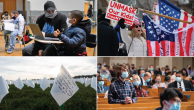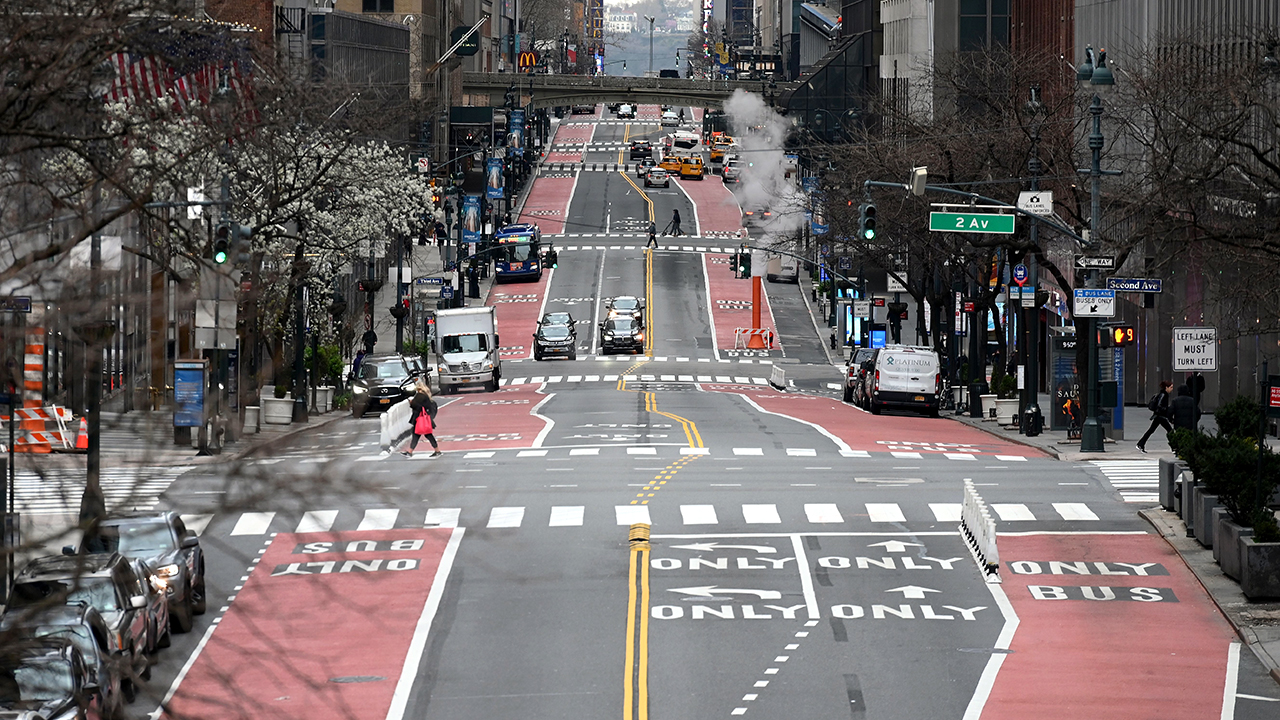
How we did this
Pew Research Center conducted this study to understand how Americans are continuing to respond to the coronavirus outbreak. For this analysis, we surveyed 11,537 U.S. adults in March 2020. Everyone who took part is a member of Pew Research Center’s American Trends Panel (ATP), an online survey panel that is recruited through national, random sampling of residential addresses. This way nearly all U.S. adults have a chance of selection. The survey is weighted to be representative of the U.S. adult population by gender, race, ethnicity, partisan affiliation, education and other categories. Read more about the ATP’s methodology.
Here are the questions used for the report, along with responses, and its methodology.
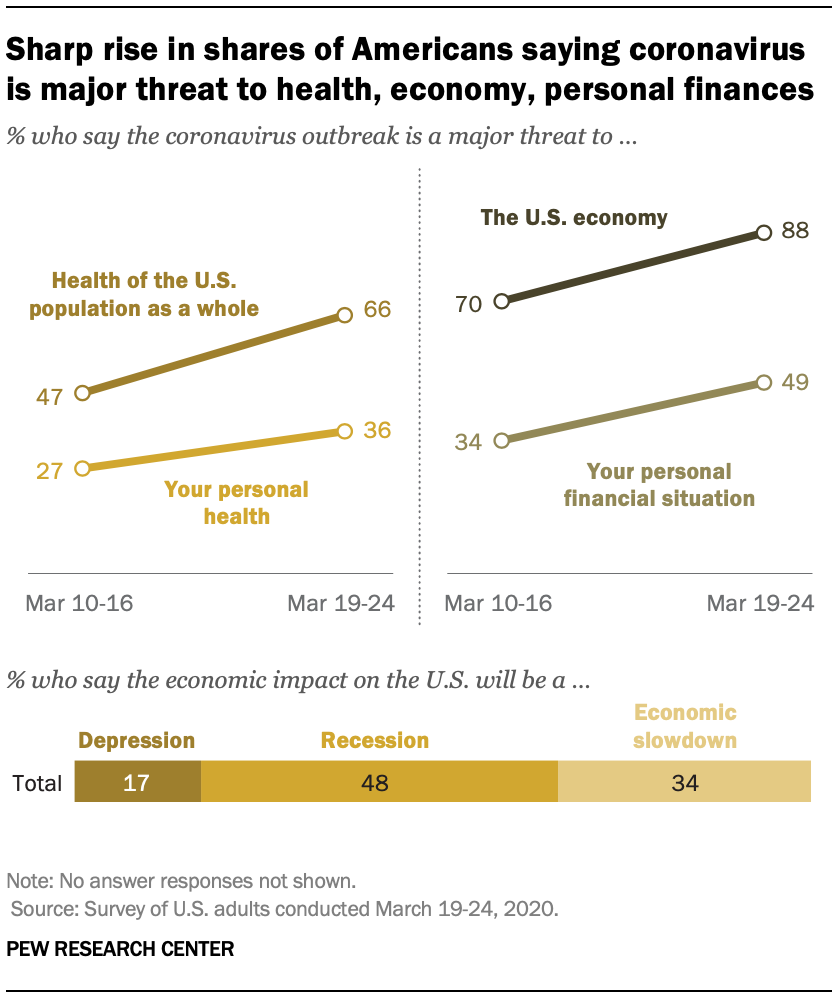
Americans are increasingly alarmed by the rapid spread of the new coronavirus, with sharply growing majorities saying the outbreak poses a major threat to the health of the U.S. population and the nation’s economy. Many report that their own lives are already being negatively affected: 33% say they or someone in their household has lost their job or suffered a pay cut or reduction in work hours because of the coronavirus.
There is broad public agreement that the nation is confronting a crisis. Two-thirds of Americans – including majorities in all major demographic and partisan groups – say COVID-19 is a “significant crisis.”
And their outlook for the national economy is bleak. Nearly two-thirds of Americans (65%) say the coronavirus outbreak will cause a recession or depression in the U.S., including nearly one-in-five (17%) who anticipate a depression.
Less than two weeks ago, 47% said the coronavirus outbreak was a major threat to the health of the U.S. population. Today, 66% say it is major threat to the health of Americans. An even larger majority – 88% – says COVID-19 poses a major threat to the U.S. economy, up from 70% in mid-March.
Americans continue to be less anxious about the personal impact of the coronavirus outbreak. Still, there have been significant increases in the shares saying the outbreak is a major threat to their own health (36% currently) and personal finances (49%).
While Democrats remain more likely than Republicans to say that the coronavirus outbreak is a major threat to public health and the economy, concerns have risen among members of both parties. They also have increased in states experiencing a large number of coronavirus cases and those that so far have been less seriously affected.
The new national survey by Pew Research Center, conducted March 19-24 among 11,537 U.S. adults using the Center’s American Trends Panel, finds that despite the partisan differences in views on several aspects of the outbreak, there also are important areas of agreement. Notably, majorities in both parties say it is necessary to impose strict limitations on commerce, travel and entertainment in order to address the outbreak.
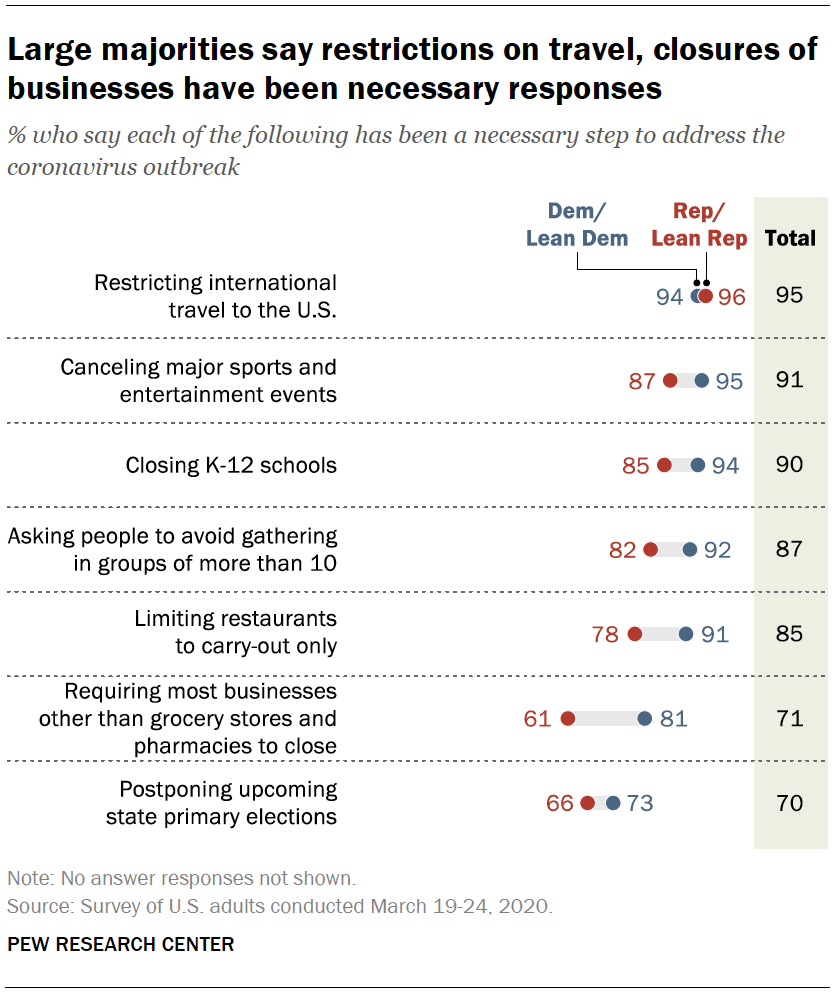
About seven-in-ten adults (71%) say that to address the coronavirus, it is necessary to require most businesses other than grocery stores or pharmacies to close. A larger share of Democrats and Democratic-leaning independents (81%) than Republicans and GOP leaners (61%) view this requirement as necessary.
An even larger majority (85%) thinks it is necessary to limit restaurants to carry-out only. And with a growing number of states announcing delays of their upcoming primary elections, 70% say this is a necessary step to take because of the coronavirus.
The public is largely positive about the way that U.S. public health officials, such as those with the Centers for Disease Control and Prevention (CDC), are responding to the outbreak. Nearly eight-in-ten (79%) say these officials are doing an excellent or good job; majorities of Republicans (84%) and Democrats (74%) express positive views of the response by public health officials.
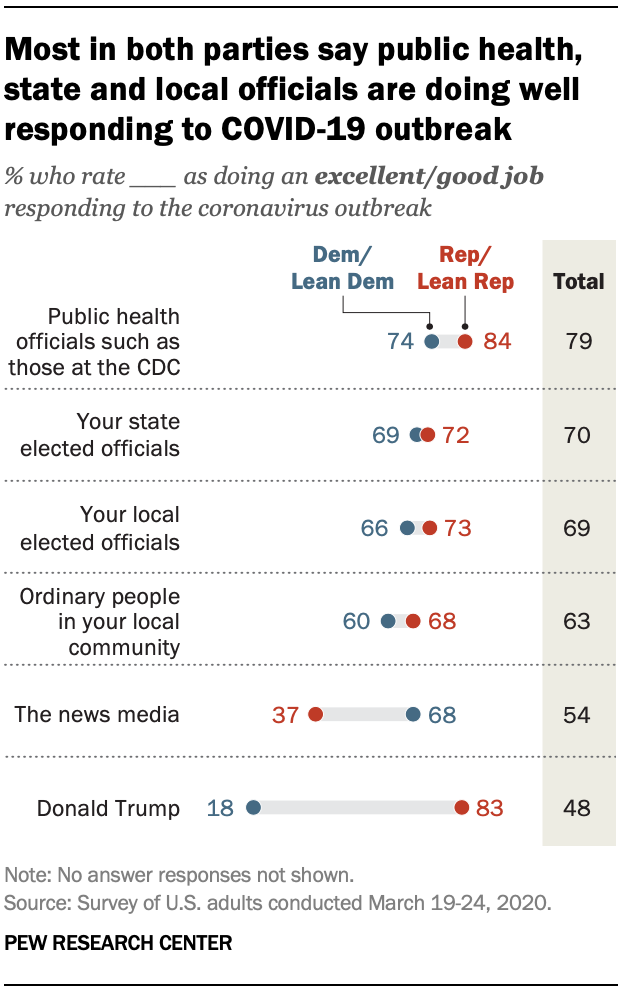
State and local elected officials also receive high marks – again, among members of both parties – for their response to the outbreak. And 63% of adults say that ordinary people in their community are doing an excellent or good job responding to the coronavirus.
Opinions about how President Donald Trump is handling the crisis are less positive, and more divided by partisanship. Nearly half of adults (48%) say Trump is doing an excellent or good job responding to the outbreak; an overwhelming majority of Republicans (83%) express positive views, compared with just 18% of Democrats.
However, Trump’s overall job rating is higher than it has been since the first few months of his presidency. Currently, 45% approve of the way he is handling his job as president, while 52% disapprove. In January, 40% approved of Trump’s job performance.
Since then, Trump’s job approval has increased significantly among a number of groups, including members of both parties, women (from 37% in January to 44% today), black adults (from 8% to 18%) and Hispanic adults (from 27% to 37%).
The new survey also finds that the public is generally confident that the nation’s hospitals and medical centers will be able to care for people afflicted with COVID-19 (see “Most Americans are confident hospitals can handle the needs of the seriously ill during COVID-19 outbreak”). All of the data in this report can be explored further by using the Election News Pathways data tool.
Here are some other major findings from the new survey:
Divided views of how people across the country are reacting to COVID-19. Only about quarter of Americans (28%) say ordinary people across the country are reacting about right to the coronavirus outbreak; 31% say ordinary people are overreacting to the outbreak, while 40% say they are not taking it seriously enough. The public also has mixed views about how ordinary people in their community are reacting. But 86% say people in their household are reacting about right to the coronavirus outbreak.
News media’s response to coronavirus outbreak. In the new survey, 54% say the news media have done an excellent or good job responding to coronavirus outbreak. Yet, as in an earlier survey, Democrats are more likely than Republicans to rate the media’s performance responding to the outbreak positively.
CORRECTION (April 2, 2020): In the chart, “Large majorities say that restrictions on travel, closures of businesses have been necessary responses,” the total share of those who say closing K-12 schools is a necessary step has been updated from 89% to 90%. The update did not affect the report’s substantive findings.
